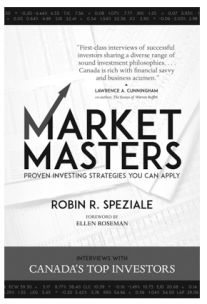Book Review - Market Masters Proven Investing Strategies You Can Apply. Robin R. Speziale.
 Market Masters: Proven Investing Strategies You Can Apply. Robin R. Speziale. ECW: Toronto, ON, 2016. 601 pp. ISBN 978-1-77041-343-6. C$22.05
Market Masters: Proven Investing Strategies You Can Apply. Robin R. Speziale. ECW: Toronto, ON, 2016. 601 pp. ISBN 978-1-77041-343-6. C$22.05
Robin Speziale had the bright idea of interviewing some of Bay Street’s most successful money managers and analyzing their different strategies and approaches to investing. He thinks that Canadians do not recognize the stars (“Market Masters”) in their midst but that we should celebrate them, and that Canadians do not recognize the importance of the TSX, the 9th largest stock exchange in the world. There are big names here: Francis Chou, Kiki Delaney, Barry Shwartz, Michael Sprung, Som Seif and 24 others, including Canadian Money Saver contributors Derek Foster, Ben Gallander, Ross Grant and Peter Hodson. Bill Ackman doesn’t quite fit because he’s Wall Street, but he’s been important in Canadian business.
The interviews are organized by the interviewee’s investment style: Value (sometimes contrarian); Growth; Fundamental (a mix of value and growth); Macro (top-down); Systematic (or technical); others. As a neat human touch, the interviews start by exploring how the interviewee became involved in investing and money management. These money managers are far more dynamic, nimble and alive than robo-advisors. The narrative then discusses their basic approaches to and experience in investing. The interviews at the rich core of the book are all engaging and fun to read, full of interesting investment tidbits, styles, philosophies, and numerous valuable (and potentially money-making) comments and asides. These are all interesting people with a lot of experience, though some are engaged more than others in the interviews and in letting go of their “secrets”.
Speziale believes that the reader can choose any one (or two) strategies and philosophies of these Market Masters and emulate them to “beat the market”. After each interview, Speziale pulls out what he sees as key points (“Master Keys”) made by the money manager to highlight the basis of their success.
I would have liked to see more numbers to be convinced by some of the Market Masters and their success because I’m not convinced that different strategies on Bay Street can be emulated by, say, readers of the CMS or even that they are all that successful. For example, I’d like to have seen the numbers generated over time through “thematic investing”, which is heavily based on charting or technical analysis. One of the points that many of the interviewees make is that generating wealth requires patience, time and the avoidance of capital loss, and that successful investors invest in successful individual companies rather than in markets, industries or countries. The book’s title may be catchy but the reality is that it’s not really the market that’s important.
What does impress about the interviews is the deep discipline and experience of most of the money managers. It’s not as easy as it might look and these people have considerable hard-earned experience and work full time at this. Ordinary Canadian investors may complain about the high fees of mutual funds but if I was a high earner making a good living in a business or profession, the fees paid to successful professional money managers such as the “three amigos” of Avenue Investment Management would be well worth the money. These and many of the other money managers interviewed have clear metrics on which they buy and sell; have good approaches to risk management; use various tricks of the trade that ordinary investors won’t have much experience in; enjoy proximity to the sparkle of Bay Street’s golden mile; and often have the ability to see through “good stories”. It is noteworthy that Speziale doesn’t interview mutual fund managers, perhaps because they’re most likely to be closet indexers and far less independent than the Market Masters.
Although Market Masters is a valuable read, it’s not totally clear who it’s aimed at. Each interview has a “pre-interview lessons” section that defines some terms, which don’t always seem to be in the interview. Speziale sometimes adds at the end the interviewees’ written recipes for success from their websites, and then includes Speziale’s summary “Master Keys” which repeats the key sentences of the interview.
Some of the interview questions come across as the interviewer being over-impressed by the interviewee and some are irritating, as in his insistence on asking many interviewees what they think of the “efficient market theory” (now well recognized to be a fallacy). The intended reader seems to be a relatively advanced student of investment management, since it’s set up a bit like a textbook, but most of these students would understand the terms being used. The repetitions and pre-interview lessons make this book a long read and don’t add to its value, and there’s lack of numbers against which we can benchmark the different Market Masters.
Still, the interviews are fun and the book represents huge effort by Speziale—but it’s not a book to be easily read on the dock at a cottage. Speziale pulls it all together in a final chapter, but tries to do too much by combining so many philosophies and approaches and making too many generalities, including getting hung up on the efficient market theory. I recommend the book to CMS readers who want to get ideas about how to go to the “next level” in investing success since there’s much of value here for every Canadian investor, but be prepared to be critical.
John Prescott is coordinator of the Guelph Share Club.


